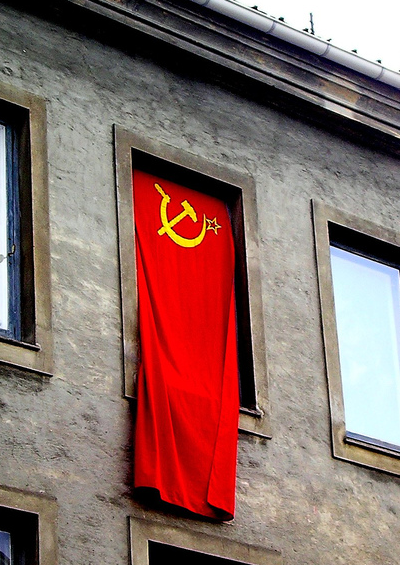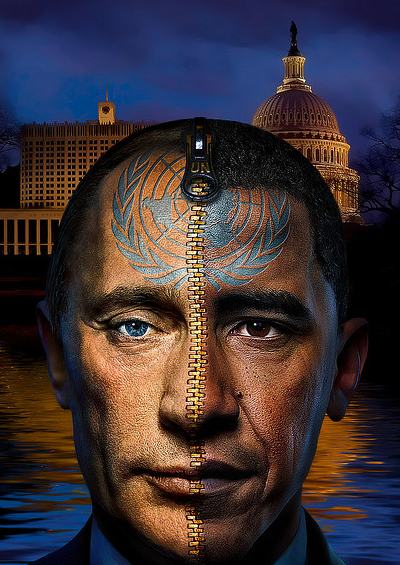Why Putin Misses the Soviet Union So Much
The Soviet Union was Russia’s most inspiring claim to Russia’s identity.
February 17, 2015

On April 26, 2005, Vladimir Putin, President of Russia, proclaimed that the fall of the Soviet Union was indeed, the catastrophe of the century. From a post-Soviet perspective, rooted in Russian identity, why would he make such a claim? To him, it is about more than power politics.
The Soviet Union was Russia’s most inspired and inspiring bid for both national and world historical identity. Like the United States, the Union of Soviet Socialist Republics offered a universal vision that all humanity would supposedly one day joyously embrace.
If the Americans had “Manifest Destiny and Mission” and regularly called on God as a witness to prove that the country was destined for greatness, the Soviets had Marx. Communism, inspired by the Soviet example and validated by the heroic fight in WWII, was cast as the inevitable conclusion of world (and human) history.
Both American and Soviet identity-creations were cunning in their insistence that the universal in their national ideas was also prospective — in the realm of things to come.
The United States aimed “to form a more perfect union” every day, while the Soviet Union cast itself as the “vanguard” of the future proletarian utopia. Both represented promises of a universal human state to be realized in the future.
Hence, both the United States and the Soviet Union could claim that the fulfillment of their respective national identity ultimately depended on the entire world sharing these values, which could come only in time, with humanity’s willing conversion.
Competing over inspiring the world
This apparent ideological contradiction endowed the competing visions of American and Soviet identity with enormous power and authority.
For the United States, it meant that a loose collection of former colonies could go forth believing themselves to be the prophetic bearers of a future global community of nations, which would someday all look to America as their leader and guide.
The USSR, in a single stroke, created the model for a new community of humanity through its very naming conventions and constitution. The old empire – from imperialist Russian cities to the imperial frontiers – was transformed at once into a united commonwealth of nominally co-equal socialist republics.
Even the Russian republic, within the larger union, reorganized itself as a commonwealth of federated Russian republics. This represented a vision of what the whole world might become as other nations rightly chose to join the Soviet international commonwealth.
In the meantime, the Soviet Union, born in adversity, might remain for some time just the kernel of a greater world community of socialist republics to come.
Hence, as Stalin enunciated in 1924, the Soviet Union felt it had to adopt, as a first step, a strategy of “socialism in one country.”
What this meant in practical terms is that the Comintern existed as a prospective identity for Soviets, while the actual world they inhabited was isolated and indeed alienated from much of the rest of humanity.
The Soviet identity was thus able to enlarge Russian identity by promising that long-sought sense of belonging. That would inevitably arrive in the universal community of humanity to come.
And even while Russians still inhabited an in-between, marginalized place in the global system of the 1920s and 1930s, the destiny of history guaranteed future breakthroughs.
Soviet victory in World War II created a wider community — enhancing the universal promise. Outside Europe, other countries, as they freed themselves from colonial rule, began exploring the socialist path. Was the breakthrough at hand?
From the Russian perspective, with the Warsaw Pact, China and other fraternal socialist republics, there was at least some basis for belief in the 1950s and 1960s that Russia was finally part of a larger community — even as the promise of a future global human community began to fade with the shock forces of the Cold War.
The Soviet Union was always the big gambit for Russian identity. Even if its universal vision could never be attained, actual attainment in the immediate present was arguably never the intention. Like the imperial visions of Russian rulers past, it was the business plan for future belonging.
Denying Russia its identity
But in its idealized workings, the Soviet Union was at heart a community concept, a commonwealth with Russia at the center. Its function, in terms of Russian identity, was to bring Russia in from the margins.
As it turned out, denying Russia what it had long sought — a place of belonging – became the West’s relentless modus operandi throughout the Cold War. The net effect of its actions was to shrink that community, marginalize and isolate it.
This strategy only intensified Russia’s purgatory. If the USSR was the big gambit for Russian identity, then “containment” was a form of civilizational exclusion committed to the utter destruction of the Soviet Union.
Containment succeeded. But the United States made no effort to offer a new place for Russia’s sense of self — both within the West and yet also commensurate with its deep identity needs.
As Russians see it, America asked for submission — and, in exchange, offered only subsidiary status. This represented a form of shame to a proud identity that had for so long lived at the edges of the wilderness.
If we look through collective Russian eyes, we can see how Putin’s declaration makes only the bitterest sense. Perhaps too, as the unraveling of their world proceeds — and comes to touch us — it may begin to make bitter sense to us as well.
Read Part I:
Putin’s and Russia’s Quest for Identity and Belonging
Takeaways
The Soviet Union was Russia’s most inspired and inspiring bid for both national and “world-historical” identity.
The US aimed to form a more perfect union and the USSR cast itself as the vanguard of the future proletarian utopia.
The Soviet Union was always the big gambit for Russian identity.
The Soviet Union’s function, in terms of Russian identity, was to bring Russia in from the margins.
The USSR was at heart a community concept, a commonwealth with Russia at the center.

